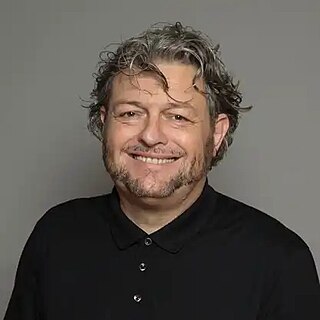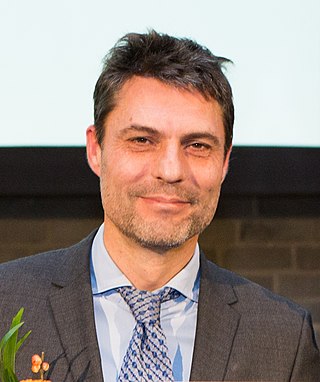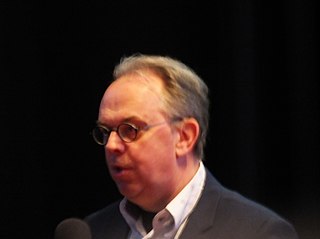
Leiden University is a public research university in Leiden, Netherlands. It was founded as a Protestant university in 1575 by William, Prince of Orange as the first university in the Netherlands.

The Royal Netherlands Academy of Arts and Sciences is an organization dedicated to the advancement of science and literature in the Netherlands. The academy is housed in the Trippenhuis in Amsterdam.

The Rijksakademie van beeldende kunsten was founded in 1870 in Amsterdam. It is a classical academy, a place where philosophers, academics and artists meet to test and exchange ideas and knowledge. The school supports visual artists with a two-year curriculum.

Henkjan Honing is a Dutch researcher. He is professor of Music Cognition at both the Faculty of Humanities and the Faculty of Science of the University of Amsterdam. He conducts his research under the auspices of the Institute for Logic, Language and Computation, and the University of Amsterdam's Brain and Cognition center.

Dorret I. Boomsma is a Dutch biological psychologist specializing in genetics and twin studies.

The Spinoza Prize is an annual award of 1.5 million euro prize money, to be spent on new research given by the Dutch Research Council (NWO). The award is the highest scientific award in the Netherlands. It is named after the philosopher Baruch de Spinoza.

The Netherlands Institute for Advanced Study in the Humanities and Social Sciences (NIAS) in Amsterdam, Netherlands, is an independent research institute in the field of the humanities and social and behavioural sciences founded in 1970. The institute offers advanced research facility for international scholars of all of the humanities and social sciences. It is a member of Some Institutes for Advanced Study (SIAS) and the Network of European Institutes for Advanced Studies (NetIAS).

Egbert (Bert) Willem Meijer is a Dutch organic chemist, known for his work in the fields of supramolecular chemistry, materials chemistry and polymer chemistry. Meijer, who is distinguished professor of Molecular Sciences at Eindhoven University of Technology (TU/e) and Academy Professor of the Royal Netherlands Academy of Arts and Sciences, is considered one of the founders of the field of supramolecular polymer chemistry. Meijer is a prolific author, sought-after academic lecturer and recipient of multiple awards in the fields of organic and polymer chemistry.

Willem Johannes Maria (Pim) Levelt is a Dutch psycholinguist. He is a researcher of human language acquisition and speech production. He developed a comprehensive theory of the cognitive processes involved in the act of speaking, including the significance of the "mental lexicon". Levelt was the founding director of the Max Planck Institute for Psycholinguistics in Nijmegen. He also served as president of the Royal Netherlands Academy of Arts and Sciences between 2002 and 2005, of which he has been a member since 1978.

Dick Frans Swaab is a Dutch physician and neurobiologist. He is a professor of neurobiology at the University of Amsterdam and was until 2005 Director of the Netherlands Institute for Brain Research of the Royal Netherlands Academy of Arts and Sciences.

Naomi Ellemers is a distinguished professor of social psychology at Utrecht University since September 2015.

Carsten Karel Willem de Dreu is a Professor of Psychology at Leiden University and previously Behavioral Economics at the University of Amsterdam. He is member of the Royal Netherlands Academy of Arts and Sciences. De Dreu received his PhD in social and organizational psychology from the University of Groningen (1993) and was president of the European Association of Social Psychology and the International Association for Conflict Management. In 2016 he was named Distinguished Research Fellow at the University of Oxford.

Michel Wedel is the PepsiCo Chaired Professor of Consumer Science in the Robert H. Smith School of Business, and a Distinguished University Professor, at the University of Maryland, College Park. He works on the development of statistical and econometric methods to analyze and predict consumer behavior, in addition to market segmentation and eye tracking research.

Eveline Crone is a Dutch professor of cognitive neuroscience and developmental psychology at Leiden University. Her research focuses on risky behaviors in adolescent humans during puberty and examines the function of those risks. For her research in adolescent brain development and behaviour, she was awarded the Spinoza Prize, the highest recognition for Dutch scientists, in 2017.
The Royal Netherlands Academy of Arts and Sciences is an organization dedicated to the advancement of science and literature in the Netherlands. The academy is housed in the Trippenhuis in Amsterdam. Founded in 1808, members are appointed for life by co-optation.
The Descartes-Huygens Prize is an yearly scientific prize created in 1995 by the French and the Dutch governments, and attributed to two scientists of international level, a French one chosen by the Koninklijke Nederlandse Akademie van Wetenschappen and a Dutch one chosen by the Académie des sciences, to reward their work and their contributions to the French-Dutch cooperation.

Beatrice A. de Graaf is a Dutch history professor at the Faculty of Humanities at Utrecht University. Her areas of expertise are terrorism, international relations and security and the modern history of Europe.
The M.W. Beijerinck Virology Prize is a prize in virology awarded every two years by the Koninklijke Nederlandse Akademie van Wetenschappen (KNAW). The prize consists of a medal and a monetary award of €35,000. KNAW's two conditions for the prize nomination are that the nominee must be an internationally recognized researcher who has "made a groundbreaking contribution to research in the field of virology in the broadest sense" and must have an appointment at a university or research institute.

Linda Steg is a Dutch psychologist who is Professor of Environmental Psychology at the University of Groningen. She studies the interaction between people and their environment and how people influence their local ecosystems. She was awarded the 2020 Dutch Research Council Stevin Prize.

Peter Hagoort is a Dutch neuroscientist who studies the neurobiology of language.

















